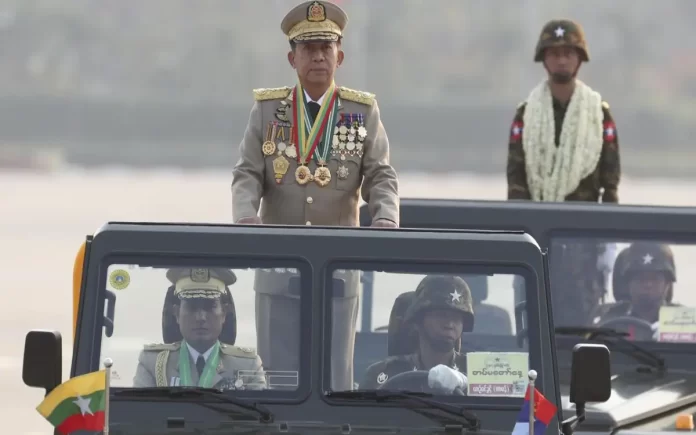Naypyidaw: In the midst of a multifaceted struggle to quell rebellion across its territory, military-ruled Myanmar contemplates the prospect of holding elections contingent upon achieving internal peace and stability, disclosed the nation’s top general.
Despite the junta’s persistent efforts to suppress dissent since seizing power in a coup three years ago, General Min Aung Hlaing reiterated the intention to eventually reinstate democratic governance in Myanmar, as conveyed in an interview with Russia’s Tass news agency, as reported by Myanmar’s state media.
This assertion comes amidst the most formidable challenge faced by the military leadership since it first assumed control of the country in 1962. What initially began as a youth-driven pro-democracy movement has evolved into an armed resistance, sparked by a brutal crackdown on widespread protests.
Read More: Simon Harris Assumes Leadership of Fine Gael, Poised to Become Ireland’s Youngest Prime Minister
The military’s engagements extend beyond the urban centers, with conflicts rekindling with ethnic minority factions in the northern and eastern regions of Myanmar. Allegations of egregious human rights violations persist, vehemently refuted by the military establishment.
General Min Aung Hlaing stated, “If the state is peaceful and stable, we have a plan to hold the election in relevant sections as much as we can even if the election is not held nationwide under the law,” reflecting the junta’s intention to pursue electoral processes in select areas if overall tranquility is achieved.
The junta’s imposition of emergency rule extensions every six months underscores its assertion of the necessity to restore stability and eliminate perceived threats, often labeled as terrorism by the regime. Military operations, including heavy artillery and air raids, target militias aligned with a parallel administration and ethnic insurgent groups, contributing to a staggering displacement of over 2.3 million individuals, as reported by the United Nations.
Read More: Embracing the Vibrancy of Holi: A Celebration of Renewal and Joy
International condemnation mounts, with critics and Western nations decrying Myanmar’s electoral prospects as a farce. The dissolution of over 40 political parties since the coup, coupled with stringent regulations hindering the formation of new entities or challenging military-backed proxies, reinforces skepticism regarding the junta’s commitment to a genuinely inclusive democratic process.



